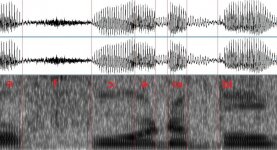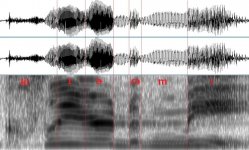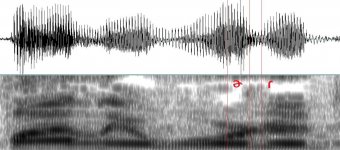The apprentice
Member
- Joined
- Sep 4, 2013
- Member Type
- English Teacher
- Native Language
- Spanish
- Home Country
- Dominican Republic
- Current Location
- Dominican Republic
Dear teachers and members:
II° - Another similar case in american English (AmE), like in the first part (part I). It is when the consonant cluster RT (an alviolar approximant plus or followed by an alviolar stop) is intervocalic and the second vowel is unstressed, the voiceless alveolar stop T is lost and the voiced alveolar approximant R becomes an approximant retroflex, thus being the only one pronounced; sounding as follows:
a) Important / ɪmˈpɔrənt /, party / ˈpɑrɪ /, article / ˈɑrɪkəl /, participle / ˈpɑrəsɪpəl /, started / stɑrɪd /.
b) It was clear to me / ɪt wəz klɪər ə mi/, I swear to God / aɪ swɛər ə ɡɒd /; She likes the imported one / ʃi laɪks ðə ɪmˈpɔrɪd wʌn /; you wish to start a business/ ju wɪʃ tə stɑr ə ˈbɪznɪs /.
OBSERVANCE:
1) This words or sentences containing this cluster may be pronounced either as RT or as R in AmE.
2) Does this process occur because these consonants share the same place of articulation (the alveolar ridge), because one is voiced and the other is voiceless or for what another reason?
3) I Found that this does not happen when the consonant cluster RT is followed by the gerund form ING in some verbs like:
Courting / kɔrtɪŋ /, skirting /skɜrtɪŋ /, reverting / rɪvɜrtɪŋ /, alerting / əˈlɜrtɪŋ /.
4) I also found this does not happen in some verbs when they are in the past or past participle tenses; is this because of the vowel sounds / ɜr/ or another reason?
Deserted / dɪˈzɜrtɪd /,perverted / pərˈvɜrtɪd/, skirted /skɜrtɪd /, alerting / əˈlɜrtɪd/.
5) Can this process also occur in the case of the voiced consonant cluster RD?; sounding as:
a) Affordable / əˈfɔrəbəl/, according / əˈkɔrɪŋ /, regarding / rɪˈɡɑrɪŋ/, awarded /əˈwɔrɪd/, order / ˈɔrər /
b) I figured it out / aɪ ˈfɪɡjər ər aʊt/; we had to learn to pronounce / wi hər ə lɜrn tə prənaʊns /
Your assistance and help will be deeply appreciated in this matter.
Sincerely,
The Apprentice.
II° - Another similar case in american English (AmE), like in the first part (part I). It is when the consonant cluster RT (an alviolar approximant plus or followed by an alviolar stop) is intervocalic and the second vowel is unstressed, the voiceless alveolar stop T is lost and the voiced alveolar approximant R becomes an approximant retroflex, thus being the only one pronounced; sounding as follows:
a) Important / ɪmˈpɔrənt /, party / ˈpɑrɪ /, article / ˈɑrɪkəl /, participle / ˈpɑrəsɪpəl /, started / stɑrɪd /.
b) It was clear to me / ɪt wəz klɪər ə mi/, I swear to God / aɪ swɛər ə ɡɒd /; She likes the imported one / ʃi laɪks ðə ɪmˈpɔrɪd wʌn /; you wish to start a business/ ju wɪʃ tə stɑr ə ˈbɪznɪs /.
OBSERVANCE:
1) This words or sentences containing this cluster may be pronounced either as RT or as R in AmE.
2) Does this process occur because these consonants share the same place of articulation (the alveolar ridge), because one is voiced and the other is voiceless or for what another reason?
3) I Found that this does not happen when the consonant cluster RT is followed by the gerund form ING in some verbs like:
Courting / kɔrtɪŋ /, skirting /skɜrtɪŋ /, reverting / rɪvɜrtɪŋ /, alerting / əˈlɜrtɪŋ /.
4) I also found this does not happen in some verbs when they are in the past or past participle tenses; is this because of the vowel sounds / ɜr/ or another reason?
Deserted / dɪˈzɜrtɪd /,perverted / pərˈvɜrtɪd/, skirted /skɜrtɪd /, alerting / əˈlɜrtɪd/.
5) Can this process also occur in the case of the voiced consonant cluster RD?; sounding as:
a) Affordable / əˈfɔrəbəl/, according / əˈkɔrɪŋ /, regarding / rɪˈɡɑrɪŋ/, awarded /əˈwɔrɪd/, order / ˈɔrər /
b) I figured it out / aɪ ˈfɪɡjər ər aʊt/; we had to learn to pronounce / wi hər ə lɜrn tə prənaʊns /
Your assistance and help will be deeply appreciated in this matter.
Sincerely,
The Apprentice.
Last edited:


